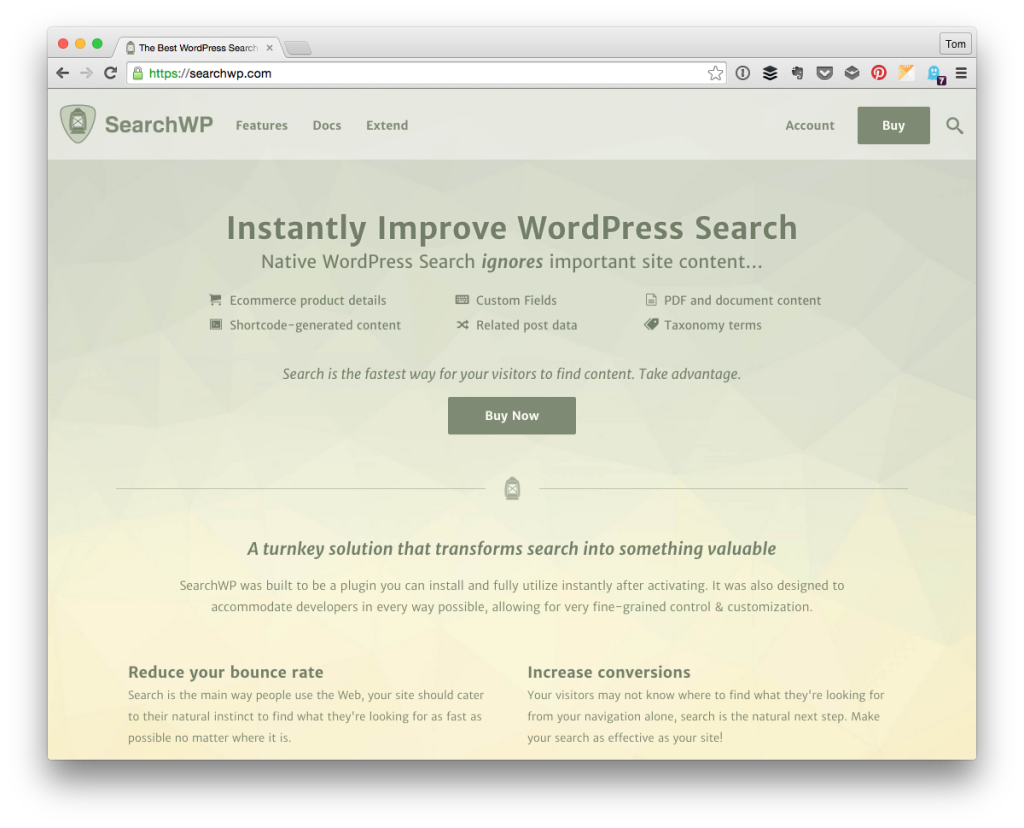For a few years now, I’ve been using SearchWP on this and on a few other sites I’ve either built or had a hand in improving.

Most people who are active in the WordPress development space are aware of this plugin (at least, I think they are), but if you’re someone who’s not involved with WordPress at that level and are looking for a way to improve the search functionality of your site, then I can’t recommend the plugin enough.
Then again, even if you are a developer and you’ve never used it, the same sentiment rings true.
SearchWP
Every now and then, I’ll recommend tools and resources I think are really valuable for people who are active users and/or developers within the WordPress space. Typically, these recommendations come long after I’ve been using them for myself, for other projects, or for both.
And that’s exactly the case with SearchWP. For those who are unfamiliar:
SearchWP was built to be a plugin you can install and fully utilize instantly after activating. It was also designed to accommodate developers in every way possible, allowing for very fine-grained control & customization.
In short, it makes searching the WordPress database more powerful.
I know – it sounds kind of developer-y (because that’s a word!), right? But if you’re someone who has worked with WordPress at any capacity – either as a blogger or a developer – and you’re someone who has dealt with the native search functionality, then you know although it’s not terrible, it does leave something to be desired.
The Interface of Search
I’d venture to say almost anyone who uses the web regularly treats Google as the interface of the Internet. That is to say we no longer directly visit web addresses, but we use Google as a type of interface that allows us to, you know, find what we’re looking for.
And search is becoming more pervasive in other things we use. The Windows Start menu has a built in search field, Apple is integrating Spotlight into everything, and our blogs even have the a Search widget.
But why aren’t we using it?
For Bloggers
If you blog with any sort of regularity, odds are you’ve amassed a pretty large number of posts over time. To that end, it’s not at all hard to imagine the case where you think:
“I know I’ve written about this before, but I don’t remember the URL.”
So what do you do? You end up running a search somewhere on your site. Maybe it’s in the Dashboard, maybe it’s via the widget, or maybe it’s via a custom query in Google.
Whatever the case, you’ve ended up searching your own blog for content before so is it hard to imagine someone else would need to do the same, as well? I think this is especially true for regular readers.
From here, it makes sense to make the search functionality as powerful and accurate as possible. And that’s why, as a blogger, I’m such a fan of the plugin.
For Developers
Even if you’re not a regular blogger but you’re someone who writes code or manages content for others in WordPress, then there’s still a reason to enhance the search functionality of the installation.
But what if you need to tailor the search so it, say, adds more weight to a certain custom post type or you want to exclude tags, handle media differently, and so on.
Or maybe you need to hook into part of the search process and handle the result set a little bit differently before it hits the browser. Whatever the case, SearchWP makes this possible through its interface and through its set of hooks.
It’s rare to find a plugin that’s as user-friendly and developer-friendly as this particular plugin, and that’s one of the primary reasons, as a developer, I’m a fan.
It’s Not Marketing…
Sometimes, writing about this kind of stuff can feel very sales-oriented or like a marketing page so I often teeter on whether or not I should publish posts like this, then I remember that I’m talking about a utility I absolutely dig, that I’ve found useful for myself and for client projects, and I think would definitely benefit others.
So I hit the Publish button.
…It’s Sharing The Goods
But a post can only go so far especially when it’s based on personal experience. I’ve been a big fan of it for all of the reasons mentioned above. For those of you who are interested in the plugin, I recommend checking out the site if, for no other reason, you want to see just how much the plugin offers.
If you’re a blogger with a lot of content, this will help to make the Search widget like a new feature of the interface of your blog.
If you’re a developer who is building large sites or web applications for clients, then this plugin will definitely improve the results people are receiving when they search the site and you have the ability to finely tune the plugin both from the interface and from a programmatic perspective.


Leave a Reply
You must be logged in to post a comment.